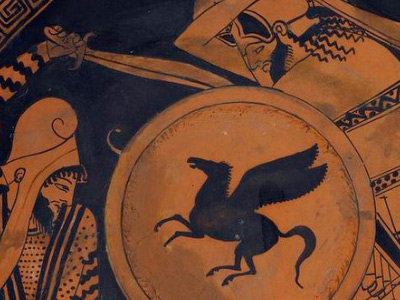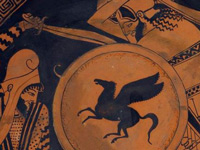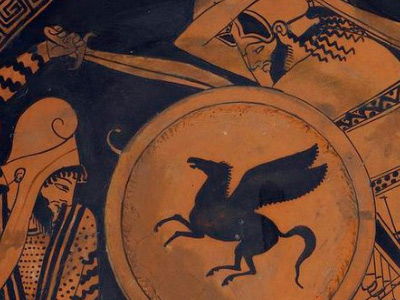Battle of Plataea (479 BC)

Background
The Greek city-states of Athens and Eretria had supported the unsuccessful Ionian Revolt against the Persian Empire of Darius I in 499–494 BC. The Persian Empire was still relatively young and prone to revolts by its subject peoples. Moreover, Darius was an usurper and had to spend considerable time putting down revolts against his rule. The Ionian Revolt threatened the integrity of his empire, and he thus vowed to punish those involved (especially those not already part of the empire). Darius also saw the opportunity to expand his empire into the fractious world of Ancient Greece.
A preliminary expedition under Mardonius, in 492 BC, to secure the land approaches to Greece ended with the re-conquest of Thrace and forced Macedon to become a fully subordinate client kingdom of Persia, the latter which had been a Persian vassal as early as the late 6th century BC. An amphibious task force was then sent out under Datis and Artaphernes in 490 BC, using Delos as an intermediate base at, successfully sacking Karystos and Eretria, before moving to attack Athens. However, at the ensuing Battle of Marathon, the Athenians won a remarkable victory, resulting in the withdrawal of the Persian army to Asia.
Darius therefore began raising a huge new army with which he meant to completely subjugate Greece. However, he died before the invasion could begin. The throne of Persia passed to his son Xerxes I, who quickly restarted the preparations for the invasion of Greece, including building two pontoon bridges across the Hellespont. In 481 BC, Xerxes sent ambassadors around Greece asking for earth and water as a gesture of their submission, but making the very deliberate omission of Athens and Sparta (both of whom were at open war with Persia). Support thus began to coalesce around these two leading states. A congress of city states met at Corinth in the late autumn of 481 BC, and a confederate alliance of Greek city-states was formed (hereafter referred to as "the Allies"). This was remarkable for the disjointed Greek world, especially since many of the city-states in attendance were still technically at war with each other.
The Allies initially adopted a strategy of blocking land and sea approaches to southern Greece. Thus, in August 480 BC, after hearing of Xerxes' approach, a small Allied army led by Spartan King Leonidas I blocked the Pass of Thermopylae, while an Athenian-dominated navy sailed to the Straits of Artemisium. Famously, the massively outnumbered Greek army held Thermopylae for three days before being outflanked by the Persians, who used a little-known mountain path. Although much of the Greek army retreated, the rearguard, formed of the Spartan and Thespian contingents, was surrounded and annihilated. The simultaneous Battle of Artemisium, consisting of a series of naval encounters, was up to that point a stalemate; however, when news of Thermopylae reached them, the Greeks also retreated, since holding the straits was now a moot point.
Following Thermopylae, the Persian army proceeded to burn and sack the Boeotian cities that had not surrendered, Plataea and Thespiae, before taking possession of the now-evacuated city of Athens. The Allied army, meanwhile, prepared to defend the Isthmus of Corinth. Xerxes wished for a final crushing defeat of the Allies to finish the conquest of Greece in that campaigning season; conversely, the Allies sought a decisive victory over the Persian navy that would guarantee the security of the Peloponnese. The ensuing naval Battle of Salamis ended in a decisive victory for the Allies, marking a turning point in the conflict.
Following the defeat of his navy at Salamis, Xerxes retreated to Asia with the bulk of his army. According to Herodotus, this was because he feared the Greeks would sail to the Hellespont and destroy the pontoon bridges, thereby trapping his army in Europe. He left Mardonius, with handpicked troops, to complete the conquest of Greece the following year. Mardonius evacuated Attica and wintered in Thessaly; the Athenians then reoccupied their destroyed city. Over the winter, there seems to have been some tension among the Allies. The Athenians in particular, who were not protected by the Isthmus but whose fleet was the key to the security of the Peloponnese, felt hard done by and demanded that an Allied army march north the following year. When the Allies failed to commit to this, the Athenian fleet refused to join the Allied navy in the spring. The navy, now under the command of the Spartan king Leotychides, stationed itself off Delos, while the remnants of the Persian fleet remained off Samos, both sides unwilling to risk battle. Similarly, Mardonius remained in Thessaly, knowing an attack on the Isthmus was pointless, while the Allies refused to send an army outside the Peloponnese.
Mardonius moved to break the stalemate by trying to win over the Athenians and their fleet through the mediation of Alexander I of Macedon, offering peace, self-government and territorial expansion. The Athenians made sure that a Spartan delegation was also on hand to hear the offer, and rejected it:
The degree to which we are put in the shadow by the Medes' strength is hardly something you need to bring to our attention. We are already well aware of it. But even so, such is our love of liberty, that we will never surrender.
Upon this refusal, the Persians marched south again. Athens was again evacuated and left to the enemy. Mardonius now repeated his offer of peace to the Athenian refugees on Salamis. Athens, along with Megara and Plataea, sent emissaries to Sparta demanding assistance and threatening to accept the Persian terms if it was not given. According to Herodotus, the Spartans, who were at that time celebrating the festival of Hyacinthus, delayed making a decision until they were persuaded by a guest, Chileos of Tegea, who pointed out the danger to all of Greece if the Athenians surrendered. When the Athenian emissaries delivered an ultimatum to the Spartans the next day, they were amazed to hear that a task force was in fact already en route; the Spartan army was marching to meet the Persians.
HISTORY

RESOURCES
This article uses material from the Wikipedia article "Battle of Plataea (479 BC)", which is released under the Creative Commons Attribution-Share-Alike License 3.0.
© Stories Preschool. All Rights Reserved.









